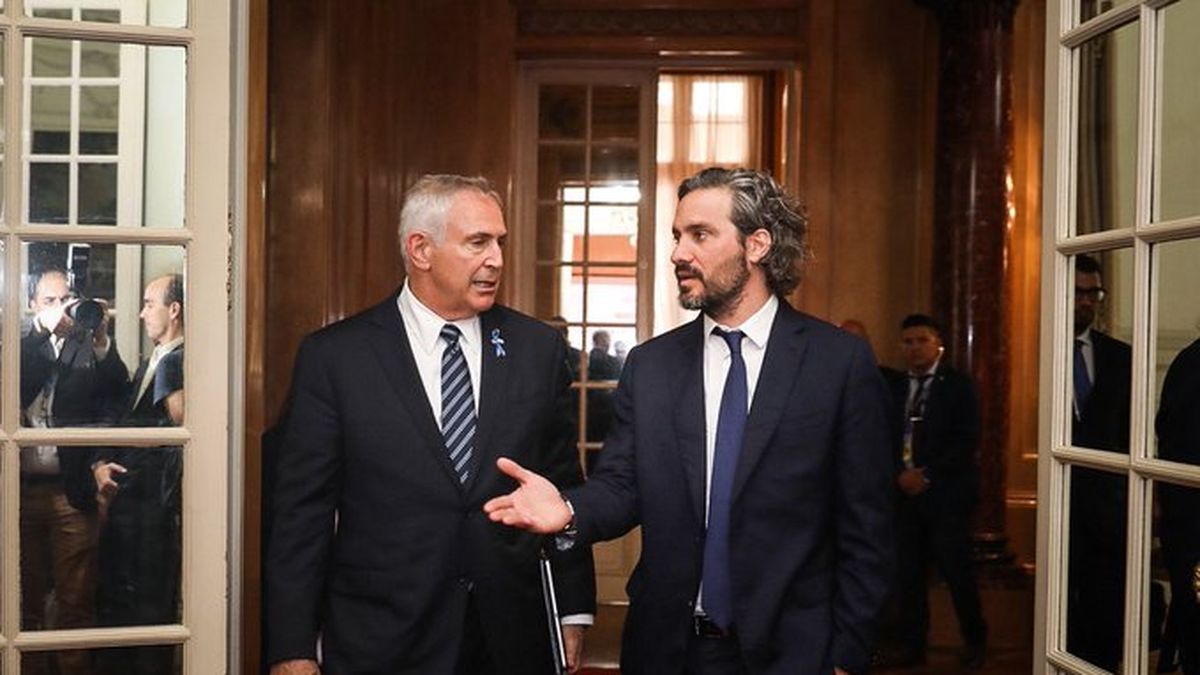Trade agreements
In a series of meetings behind closed doors, between Wednesday and Thursday at the Foreign Ministry, the Trade and Investment Framework Agreement between Argentina and the United States was carried out. It was led by the Ministry of Foreign Affairs, through officials such as Cecilia Todesca, Secretary for International Economic Relations, and Ramiro Ordoqui, Undersecretary for Multilateral Economic Negotiations. On the US side, the mission was led by Daniel Watson, trade representative for the Western Hemisphere.
It is the third time that a meeting of this type has been held. The last one had been in 2018, and then it was interrupted, largely due to the pandemic. In September of this year, the Argentine government asked to resume it. “We are in a very good moment of relations,” said an official source. As Ámbito was able to find out, the Foreign Ministry took three specific requests for foreign trade and in the next 20 days they expect a road map with specific resolutions to begin.
On the one hand, expand the quota of meat exports, today in 20 thousand tons. On the other hand, unlocking some specific products, such as lemons and biodiesel, so that they can enter the country. Finally, it was requested to put the magnifying glass on all the judicial actions that the United States has in the World Trade Organization (WTO): The Foreign Ministry estimates that a third of the exports that could enter that country do not arrive due to these actions.
The objective is to reduce the trade deficit that Argentina has with the US. Only in goods, it was almost US$1 billion in 2021, and with services it practically doubles, according to official sources. In addition, the Foreign Ministry showed the US delegation the strategic areas for investment: lithium, hydrogen and renewable energy, facing the energy transition, and Vaca Muerta, in a context of global energy crisis. On the other hand, Ámbito consulted what is requested in return: according to official sources, the strongest “incentive” is to be able to have security when it comes to supplying the resources that the world will need, and that Argentina has. In addition, there were questions about the lack of regulatory frameworks in these strategic sectors, where the answer was that they are being drafted (such as hydrogen). Of course, there was no shortage of comments about the difficulties US companies have in transferring currency in Argentina, either for dividends or repayment of credits. An official from the Ministry of Commerce also participated in these meetings, who explained how the new import system works.
Amcham business forum
This Thursday, in an auditorium full of executives, the Argentina-United States Business Forum was held, organized at the San Martín Palace by Amcham. The title was “Rethinking global value chains”. At the opening, Foreign Minister Santiago Cafiero spoke of “strengthening the bilateral relationship” and said that the agenda is so rich that it covers “from end to end from regional economies to the development of nuclear technology.”
coffee marc2.jpg
In fact, Cafiero recalled the moment he met Marc Stanley, US ambassador to Argentina, who was at his side: “He played an important role in being able to facilitate agreements when negotiating with the IMF.” And then he stated: “Argentina showed that we are not interested in representing a model of default, but of development and work.” On the subject of global value chains, Cafiero assured that the paradigm was broken in the pandemic, with the possibility of the relocation of companies. “We see great positivity for Argentina and the United States to integrate these chains, make them shorter and safer, and have a role in this debate, we do not want to be the link in the chain in raw materials, because it does not include 40 million, we want to add science and technology”.
At his side was Facundo Gómez Minujin, president of Amcham, who revealed that it was an idea of the Foreign Ministry to hold the meeting there. “The full room is the result of that,” he said, adding: “Argentina has unique potential right now.” Also on stage, Ambassador Stanley, in a speech in English, assured that “Argentina has a lot to offer” in terms of energy and food security. “Global demand can be met by unlocking the potential of Vaca Muerta, we can do it with you to develop the resources.” And he even took advantage of the speech to make a joke: “We have things in common, we both did well in the Cup this week, it makes me nervous and we have to face each other, I’m going to have to move to Brazil.”
Four panels were then held, on energy security, electromobility, the knowledge economy and the new agro-industry. Weighty executives spoke, such as Daniel de Nigris, CEO of Exxon Mobil, Pablo Iuliano, CEO of YPF, Federico Ovejero, vice president of General Motors, Néstor Nocetti, co-founder of Globant, Víctor Valle, representative of Google and Fernando García Cozzi, from Cargill Argentina. The general conclusion that emerged from the speeches is that they consider that the biggest challenges for Argentina are the lack of infrastructure and guaranteeing legal certainty.
Source: Ambito
David William is a talented author who has made a name for himself in the world of writing. He is a professional author who writes on a wide range of topics, from general interest to opinion news. David is currently working as a writer at 24 hours worlds where he brings his unique perspective and in-depth research to his articles, making them both informative and engaging.




